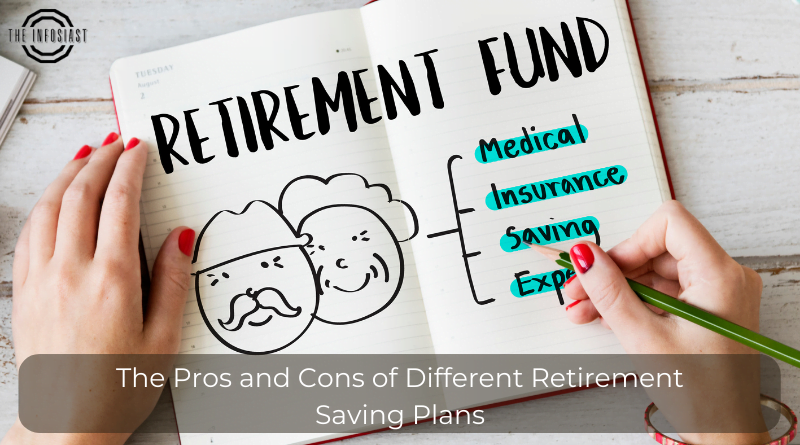
Planning for retirement is an important financial goal that requires careful consideration of various factors. One crucial aspect is choosing the right retirement saving plan that aligns with your financial needs and long-term goals. In this article, we will explore the pros and cons of different retirement saving plans, providing you with valuable insights to make informed decisions. Whether you are an employee, self-employed individual, or business owner, understanding the options available will help you maximize your savings and secure a comfortable retirement.
Employer-Sponsored 401(k) Plans
One popular retirement saving plan is the employer-sponsored 401(k) plan. These plans offer several advantages, including:
a) Tax Advantages: Contributions to a traditional 401(k) plan are tax-deductible, allowing you to lower your taxable income. Additionally, earnings on investments grow tax-deferred until withdrawal.
b) Employer Matching: Many employers provide a matching contribution to employee 401(k) accounts, effectively boosting your retirement savings.
c) Higher Contribution Limits: Compared to individual retirement accounts (IRAs), 401(k) plans generally allow for higher annual contribution limits, enabling you to save more towards retirement.
However, there are also some drawbacks to consider:
a) Limited Investment Options: 401(k) plans typically offer a limited selection of investment options determined by the employer.
b) Early Withdrawal Penalties: Withdrawing funds from a 401(k) before the age of 59½ may result in penalties and taxes.
Individual Retirement Accounts (IRAs)
IRAs provide individuals with another avenue for retirement savings. Here are the pros and cons:
a) Flexibility: IRAs offer a wide range of investment options, allowing you to customize your portfolio based on your risk tolerance and investment preferences.
b) Tax Benefits: Traditional IRAs offer tax-deductible contributions, while Roth IRAs provide tax-free withdrawals in retirement.
c) Potential for Higher Returns: With greater investment freedom, you can potentially earn higher returns compared to employer-sponsored plans.
On the flip side, there are a few considerations:
a) Contribution Limits: IRAs have lower annual contribution limits compared to 401(k) plans, limiting the amount you can save each year.
b) No Employer Matching: Unlike 401(k) plans, IRAs do not come with employer matching contributions.
Self-Employed Retirement Plans
For self-employed individuals and small business owners, there are specific retirement plans designed to meet their needs. Let’s explore the advantages and disadvantages:
a) Solo 401(k): This plan allows self-employed individuals to contribute as both the employee and employer, potentially enabling higher contribution amounts.
b) Simplified Employee Pension (SEP) IRA: SEP IRAs offer higher contribution limits and flexibility for self-employed individuals and small business owners.
c) Defined Benefit Plans: These plans allow for significant tax-deferred contributions and are suitable for those with higher income levels.
However, there are considerations to keep in mind:
a) Administrative Responsibilities: Self-employed retirement plans often involve more administrative tasks and associated costs.
b) Required Contributions: Some plans, such as defined benefit plans, may require mandatory annual contributions, which can impact cash flow.
Selecting the right retirement saving plan is crucial for building a secure financial future. Employer-sponsored 401(k) plans provide tax advantages and employer matching, while IRAs offer flexibility and investment options. Self-employed retirement plans cater to the specific needs of self-employed individuals and small business owners. Assess your goals, financial situation, and risk tolerance to determine the most suitable option for you. Consider seeking professional advice from a financial advisor to ensure your retirement plan aligns with your long-term objectives. By making informed decisions and regularly reviewing and adjusting your strategy, you can pave the way to a comfortable retirement.
Remember, each retirement saving plan has its own advantages and disadvantages. By understanding the pros and cons of different plans, you can make informed decisions that align with your financial goals and aspirations.



